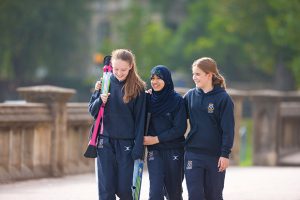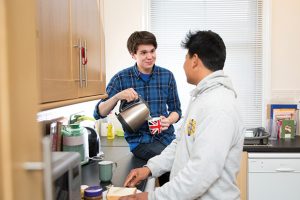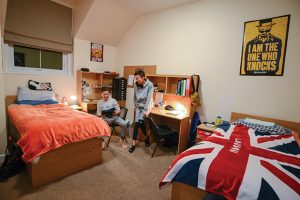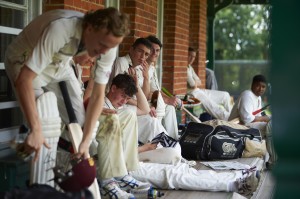Information and advice for students about how being a boarder differs from being a day pupil, and how you can adjust to the boarding way of life
Leisure activities
 One of the key features of boarding school life is the wide range of activities and experiences, which gives boarders opportunities to develop skills and interests beyond the academic curriculum. These skills and interests often contribute to career development. Living and studying in one place provides much more time for you to get on with whatever you enjoy in the company of your friends. Sports and hobbies, dance and drama, music and art, public speaking, aerobics, philosophy, pottery, gymnastics and much more are all on offer at most boarding schools and most activities are included in the school fees.
One of the key features of boarding school life is the wide range of activities and experiences, which gives boarders opportunities to develop skills and interests beyond the academic curriculum. These skills and interests often contribute to career development. Living and studying in one place provides much more time for you to get on with whatever you enjoy in the company of your friends. Sports and hobbies, dance and drama, music and art, public speaking, aerobics, philosophy, pottery, gymnastics and much more are all on offer at most boarding schools and most activities are included in the school fees.
To help you get the most out of your leisure activities, you’ll be helped and encouraged by appropriately qualified members of staff and/or accredited coaches, some of whom have won international acclaim in their sport or skill. Not only will they offer expert training, but they will also ensure the safety of those leisure activities that require it.
Many leisure activities have links with other schools and the wider community. Competitions, for individuals and teams, cover everything from sport to public speaking and take place both within the UK and overseas. National sporting events, for example, include the Independent Schools Football Association cup and the Independent Schools Golf Open. Non-sporting events include the BBC Choir of the Year competition and the annual Public Speaking Competition for Schools.
School location
If you are used to having to spend an hour or more each day travelling to and from school, at boarding school you will enjoy the luxury of waking up in the morning and being in the middle of the campus. No more carrying a heavy schoolbag or sitting in traffic jams! Many boarding schools are located in beautiful countryside. Here you have the opportunity to enjoy learning about the surrounding area. For a lot of students, the best aspects of boarding school life are playing sports and enjoying outdoor activities in a spectacular environment.
Free time
 Living at boarding school may make a great difference to how you spend your free time. It will certainly offer you the opportunity to do things which you’ve never done before, but may also restrict you in ways you’re not used to if you have had a lot of freedom already. Remember that you will be one of a community of possibly several hundred pupils for which the school is responsible. Schools need to have rules about when you can come and go, and with whom, so that they know where you are and that you are safe.
Living at boarding school may make a great difference to how you spend your free time. It will certainly offer you the opportunity to do things which you’ve never done before, but may also restrict you in ways you’re not used to if you have had a lot of freedom already. Remember that you will be one of a community of possibly several hundred pupils for which the school is responsible. Schools need to have rules about when you can come and go, and with whom, so that they know where you are and that you are safe.
The amount of freedom you get depends on how old you are, the school’s policy and the location of the school – you may be allowed slightly more freedom in rural areas than in schools based in towns or cities, for example. Younger students are supervised by an adult when they are outside the school campus. Students of this age will be taken out by a member of staff at the weekend, and perhaps briefly midweek, to go shopping or see the local area. As you get older, you will have more freedom, but pupils are expected to stay on school premises for much of their time.
In the sixth form (from age 16 and older), students may be allowed to sign themselves out, stating when they will return, although there will still be rules about when you can go out and for how long. Even when you are 17 or 18, your school will probably expect you to be back in the boarding house by 10pm on Saturdays. You won’t miss out on entertainment, however, as schools often organise informal parties or discos during term time, and more formal dances or proms for the end of the school year.
Attractions such as museums and small shops tend to close at around 5 or 6pm, particularly in rural areas. Large supermarkets tend to stay open later, but can be difficult to get to without transport. Restaurants remain open until about 10 or 11pm. If you come from a culture where you take a siesta in the afternoon and go out later in the evening – or if you have had the freedom to stay out later at home – the earlier hours of boarding school will mean a change of lifestyle.
Community life
 At boarding school, you are living in a community, so if you are used to a more solitary life you will need to adapt. Until the sixth form, you will most probably be sharing a bedroom and the bathrooms. However, what you lose in privacy you gain in companionship. Bullying is never tolerated and you will be surrounded by people who know exactly what it’s like to be living away from home and who understand the occasional times when you may feel homesick. As part of a close and supportive community you can make friends for life, whatever part of the world they come from.
At boarding school, you are living in a community, so if you are used to a more solitary life you will need to adapt. Until the sixth form, you will most probably be sharing a bedroom and the bathrooms. However, what you lose in privacy you gain in companionship. Bullying is never tolerated and you will be surrounded by people who know exactly what it’s like to be living away from home and who understand the occasional times when you may feel homesick. As part of a close and supportive community you can make friends for life, whatever part of the world they come from.
Among your new friends it’s still very easy to stay in touch with your old ones. You will be given your own e-mail address and have broadband internet access, at least in the IT centre. Many boarding houses also have Wi-Fi for those pupils with laptops. Mobile phones are allowed, although schools tend to restrict when you can use them (no texting in lessons!). Schools also recognise that phoning home from a mobile is expensive so sell phone cards for to you to use in school telephones. Remember to check the time difference if you are phoning home – however pleased your family and friends will be to hear from you, they won’t appreciate being woken at three in the morning!
Food
Schools and colleges have modern dining rooms where three cooked meals of breakfast, lunch and supper are provided each day. Some schools allow senior students to prepare their own breakfast in their boarding house if they wish. All meals have a good choice of different dishes, so you can choose what you prefer to eat. Schools always provide vegetarian alternatives, and can cater for special diets and religious requirements, providing they have been notified of such requirements in advance. You will be able to keep small amounts of your favourite food or prepare simple snacks or hot and cold drinks in your boarding house. Most schools also have a ‘tuck shop’ that sells drinks, sweets and small items such as stationery, shoelaces, etc.
Preparing for life after school
 Life in a boarding school is an excellent preparation for university and employment as it provides many of the non-academic skills that selectors are looking for. Boarders have to be tolerant, able to live with other people and yet think for themselves. Boarding schools encourage you to care for others and get involved, but also to have your own opinion and not to follow others blindly. Experience of boarding teaches you to be independent, but also makes you more appreciative of your family and home life.
Life in a boarding school is an excellent preparation for university and employment as it provides many of the non-academic skills that selectors are looking for. Boarders have to be tolerant, able to live with other people and yet think for themselves. Boarding schools encourage you to care for others and get involved, but also to have your own opinion and not to follow others blindly. Experience of boarding teaches you to be independent, but also makes you more appreciative of your family and home life.
Most pupils feel homesick now and then while at boarding school, but this will probably happen whenever you have to leave home, at whatever age. The boarding school experience puts you in touch with a network of like-minded people from across the globe and gives you a great foundation on which to build at university and in later life.
A typical boarding day
Schools vary, but the daily routine is usually similar to the example given below. For younger pupils, the prep times in the evening will be shorter and finish earlier.
7.00 Wake-up bells Get up, shower and dress in uniform.
7.45 Breakfast Held in school dining hall, with a good choice of food from the breakfast buffet.
8.30 House meeting Notices and announcements. Roll call (register) taken.
8.45 Chapel Hymns, prayers, and a short address from the school chaplain. Usually compulsory, although some schools allow exemptions if requested.
9.00 Lessons begin Three lessons, each lasting 40 minutes (eg mathematics, English, geography).
11.00 Break Go to your house and have a drink and a snack, eg juice and a piece of fruit or a biscuit.
11.20 Lessons Two lessons (eg double science).
12.40 Lunch Lunch in dining hall – many hot dishes (including vegetarian options), salad, baked potatoes, cold meats and fish, and dessert. Usually very lively with a buzz of conversation and discussion about the afternoon’s activities.
13.15 Activities There are so many to choose from – orchestra practice, private music lesson, play rehearsal, clubs, extra English lessons for international students, etc.
14.00 Lessons Two 40-minute lessons (eg French* and history).
15.20 Tea Tea or juice and a cake or a sandwich.
15.30 House Change into sports kit.
15.45 Sport Winter term – football, hockey, rugby, netball, squash, badminton, etc. Spring and summer terms – cricket, tennis, swimming, athletics, etc.
17.30 House Wash or shower, change clothes. Roll call taken.
18.00 Supper Taken in dining hall (a selection of hot and cold dishes, including many healthy-eating options, plus fruit and desserts).
18.30 Clubs/activities Debating, science society, choir, modern languages society.
19.30 Prep in houses Homework, supervised by houseparents or prefects.
20.00 Prep break
20.10 Prep continues
21.00 Free time After another roll call, it’s time to relax! You can chat with your friends, watch TV, play table tennis, snooker, etc.
22.00 Bedtime Time to go to your room and get ready for bed.
22.30 Lights out Go to sleep – it’s another busy day tomorrow!
* International students at a traditional boarding school will usually follow the main school timetable. However, when the UK students study another language (eg French), the international pupils will have extra English language classes. They may also have English lessons during the lunch break or in the evening.